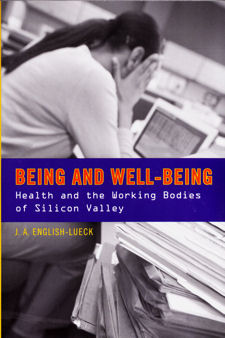Silicon Valley Cultures Project
| HOME | PUBLICATIONS |
| Book Description | ||
| Being and Well-being: Health and the Working Bodies of Silicon Valley |
LOOK IN THE BOOK |
|
by J.A. English-Lueck Available from
Stanford University Press "A remarkable book. Personal narratives bring vividly to life the generational differences in perspectives toward work and health, as well as illuminate the diversity and complexity of the shared environment in which these lives are led.Being and Well-Being raises important questions regarding the changing nature of work, of healthcare, of personal agency, of social networks, of cultural pluralism and of social justice, to name only a few." As the great American work-benefit experiment erodes, companies are increasingly asking people to take responsibility for managing their own health. There's no question work and health are intertwined. But what effect does an intensely productive, globally connected, high-tech work environment have on a population largely entrusted with overseeing their own health needs? In California's Silicon Valley, a distinctive and medically diverse health culture has emerged. Being and Well-Being explores this health culture, detailing the biomedical, countercultural, and immigrant-based beliefs and practices that shape ideas about working, care-giving, and what it means to be healthy. As English-Lueck shows, the integration of workplace productivity with personal health has created national patterns of discrimination against those not in the productive mainstream, including the unemployed, retired, and chronically ill. But new ideas about work and health can clarify core American values, highlight emerging global trends, and provide a vital assessment of the evolution of our shared pursuit of well-being. While policymakers debate the possibilities for health insurance reform and government provisions, they overlook this lived experience. The shift of responsibility from organization to individual, a key feature of late capitalism, has significant implications. Individuals are supposed to be unfettered innovators at work, while managing the mundane details of their pensions and health plans. Workers are simultaneously responsible for work projects and for themselves as projects. Here, where work and health collide, in the front offices and on the warehouse floors, is one of the key ways in which people, in the guise of workers, feel capitalism. © 2007 by the Board of Trustees of the Requests for review copies should be directed to |
||


